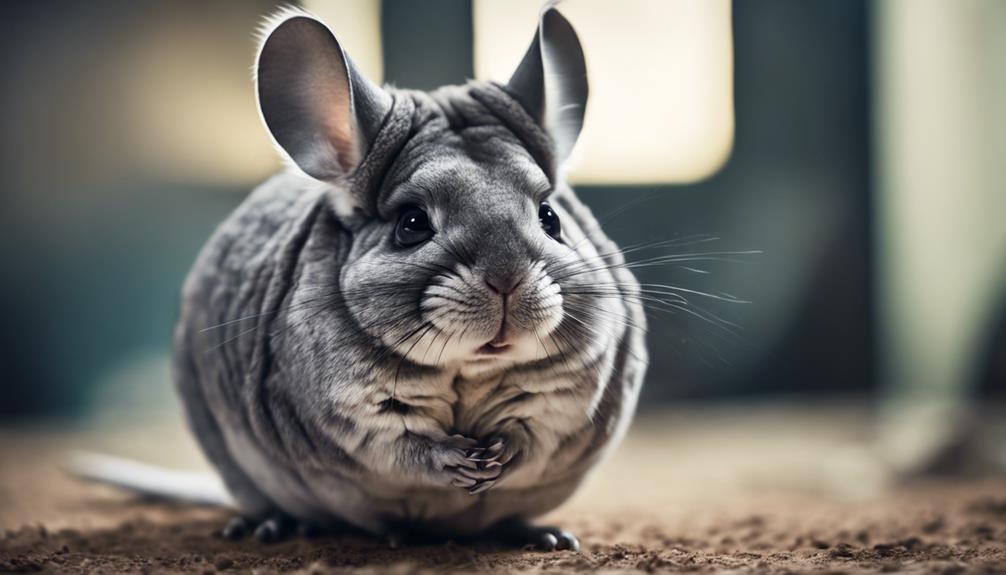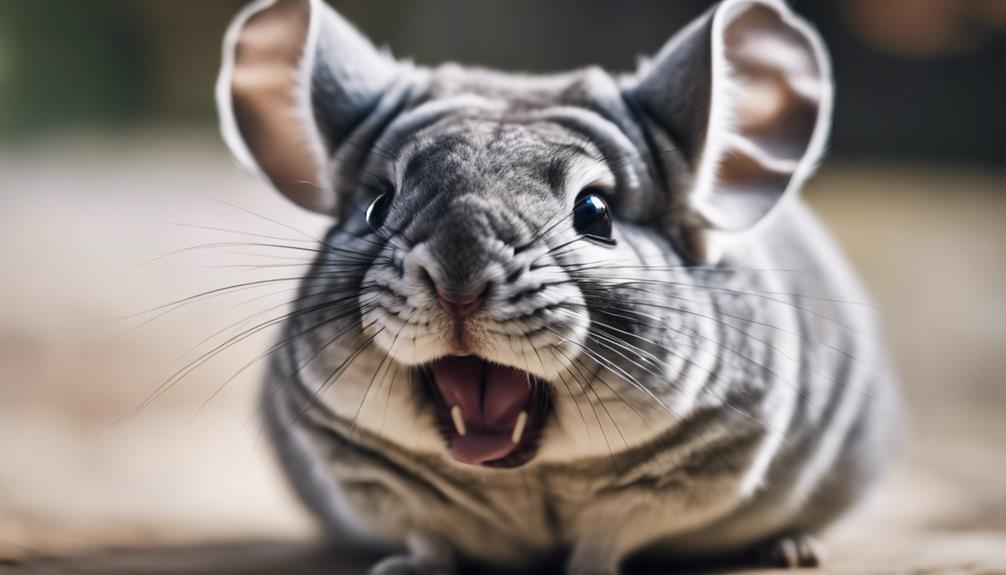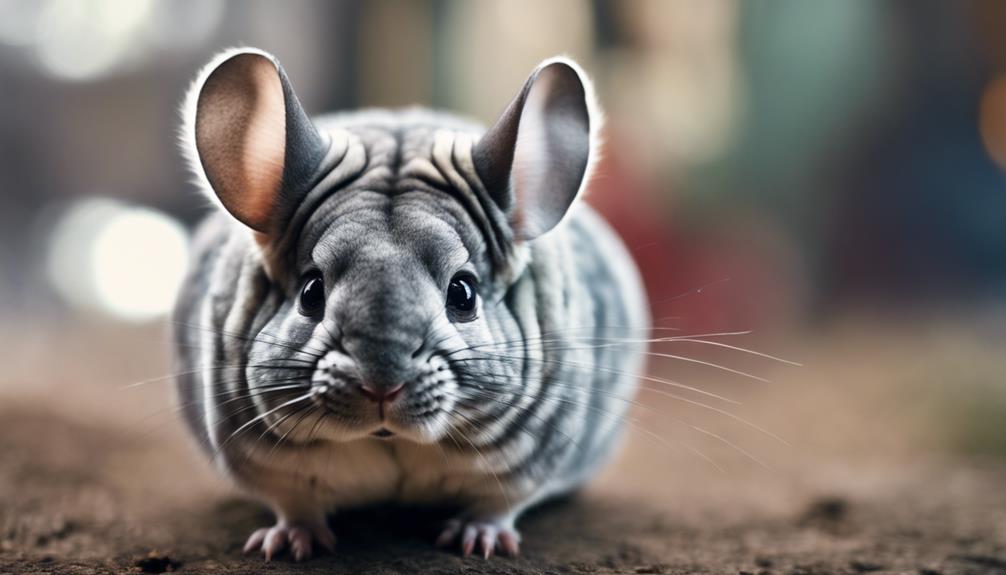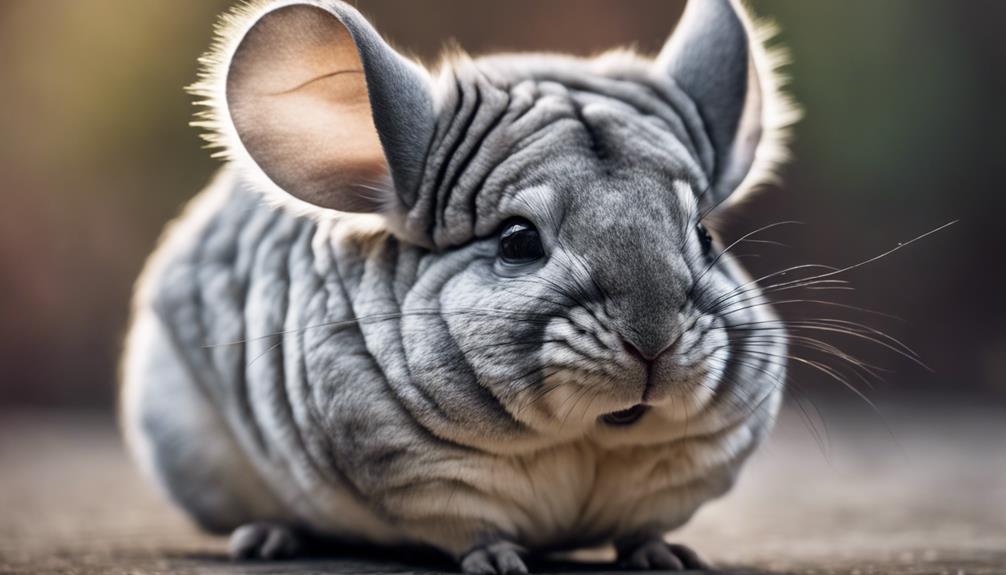How to Spot Signs of Stress in Chinchillas

Chinchillas are sensitive animals that can easily become stressed in certain situations. It's important for chinchilla owners to be able to recognize the signs of stress in their pets so they can take appropriate action.
Some behavioral indicators of stress in chinchillas include excessive chewing or digging, increased aggression towards other chinchillas or people, and a decrease in grooming or other normal activities.
Physical signs of stress in chinchillas can include weight loss, changes in fur quality, diarrhea, or a hunched posture. If you notice any of these signs in your chinchilla, it's important to try to identify and eliminate the source of stress to help your pet feel more comfortable and happy.
Behavioral Changes
When chinchillas experience stress, they may exhibit noticeable changes in their behavior. Stress indicators in chinchillas can manifest through various behavioral cues that are essential to recognize.
One common behavioral change is increased hiding or burrowing behavior. Stressed chinchillas tend to seek out secluded spots or burrow deeper into their bedding to escape perceived threats.
Additionally, heightened aggression or irritability towards cage mates or even their owners can be a sign of stress. Chinchillas may become more vocal, displaying excessive vocalizations like barking or chirping more frequently than usual when stressed.
Another behavioral cue is excessive grooming or fur pulling, indicating a response to heightened stress levels. It's crucial to observe any sudden changes in behavior as they can provide valuable insights into the chinchilla's emotional state.
Decreased Appetite

Chinchillas experiencing stress may exhibit a decreased appetite as a prominent indicator of their emotional state. When a chinchilla's appetite decreases, it may be a sign of underlying stress that needs attention. In such cases, it's crucial to consider dietary adjustments to encourage the chinchilla to eat.
Offering a variety of fresh hay, high-quality pellets, and fresh vegetables can help entice the chinchilla to eat despite the stress they may be experiencing. Additionally, providing nutritional supplements like vitamin C or probiotics can support the chinchilla's overall health and well-being during this challenging time.
It's important to monitor the chinchilla's food intake closely and consult with a veterinarian if the decreased appetite persists. By proactively addressing the decreased appetite through dietary adjustments and nutritional supplements, caregivers can help their chinchillas manage stress more effectively and promote a healthy recovery.
Weight Loss

Weight loss in chinchillas can be a concerning indication of underlying health issues, necessitating prompt attention and intervention. When a chinchilla experiences weight loss, it is crucial to take immediate action. Monitoring the chinchilla's weight regularly and ensuring proper nutrition are essential steps in maintaining their well-being. Any sudden changes in weight should prompt a thorough evaluation of the chinchilla's diet and overall health. Consulting a veterinarian is imperative to rule out any medical conditions that may be causing the weight loss.
| Signs of Weight Loss | Actions to Take |
|---|---|
| Reduced appetite | Adjust diet and monitor closely |
| Lethargy | Seek veterinary consultation |
| Changes in fur quality | Provide a balanced diet |
Dietary changes may be necessary to address weight loss, but it is essential to do so under the guidance of a professional. By closely monitoring the chinchilla's weight and ensuring they receive proper nutrition, you can help them maintain a healthy weight and overall well-being.
Aggression

Addressing aggression in chinchillas requires a thorough understanding of their behavior and potential triggers. Handling aggression and dealing with aggression in chinchillas is crucial to maintain their well-being. Chinchillas can display aggression due to various reasons, and it's essential to address these behaviors promptly.
Here are some key points to consider:
- Body Language: Pay close attention to the chinchilla's body language, such as flattened ears or raised fur, which can indicate aggression.
- Environmental Factors: Evaluate the chinchilla's living environment for any stressors that could be triggering aggressive behavior.
- Social Interactions: Monitor social interactions between chinchillas, as conflicts can lead to aggression.
- Training and Socialization: Implement training and socialization techniques to help chinchillas learn appropriate behaviors and reduce aggression.
Excessive Grooming

Chinchillas experiencing stress may exhibit excessive grooming, leading to hair loss, often seen as a primary indicator. This behavior can result in skin irritation, manifested through redness, dryness, or flakiness, signaling an underlying issue.
Observing changes in a chinchilla's behavior, such as increased grooming frequency or obsessive behavior, can provide crucial insights into their mental and physical well-being.
Hair Loss Indicators
Excessive grooming in chinchillas can be a key indicator of stress, as it often leads to hair loss. When observing your chinchilla for signs of stress-related hair loss, keep an eye out for the following indicators:
- Tail flicking, excessive grooming: If you notice your chinchilla constantly flicking its tail and excessively grooming itself, it may be experiencing stress that's manifesting in hair loss.
- Patchy fur: Check for patches of fur that appear thinner or uneven, as this could be a result of excessive grooming due to stress.
- Bald spots: Complete hair loss in certain areas, leading to bald spots, is a clear sign that your chinchilla's stress levels may be elevated.
- Overly sensitive skin: Due to excessive grooming, the chinchilla's skin may become more sensitive or irritated.
Keeping a close watch on these indicators can help you address your chinchilla's stress levels promptly.
Skin Irritation Signals
Observing chinchillas for signs of stress-related skin irritation due to excessive grooming is crucial for maintaining their overall well-being. Skin health in chinchillas is closely tied to their grooming habits. Excessive grooming can lead to skin irritation, causing redness, inflammation, or even sores.
Environmental stressors, such as loud noises or sudden movements, can trigger chinchillas to over-groom. Additionally, improper handling techniques can cause chinchillas to feel anxious, leading to excessive grooming as a coping mechanism.
It's essential to monitor your chinchilla's skin regularly, looking for any signs of irritation. If skin issues persist, consulting a veterinarian specializing in exotic pets is recommended to address the underlying problem and ensure your chinchilla's skin health.
Behavioral Changes Observed
Regularly monitoring your chinchilla for changes in grooming behavior can provide valuable insights into their well-being and potential stress levels. Excessive grooming is a common behavioral shift that may indicate stress in chinchillas. Here are some stress indicators related to excessive grooming:
- Patchy Fur: Areas of fur loss or uneven patches on the chinchilla's coat.
- Skin Irritation: Redness, inflammation, or sores on the skin due to over-grooming.
- Obsessive Licking: Constant licking of certain body parts, leading to bald spots.
- Agitated Behavior: Increased restlessness, aggressiveness, or signs of discomfort during grooming sessions.
If you notice these behavioral changes, it's crucial to address the underlying stress factors promptly to ensure your chinchilla's well-being.
Hiding Behavior

Chinchillas may sometimes exhibit a tendency to conceal themselves in their environment as a coping mechanism when stressed. Observing their hiding habits is crucial in recognizing stress indicators in these small rodents. When chinchillas feel overwhelmed or anxious, they often retreat to secluded spots within their habitat, such as burrowing into their bedding or hiding in tunnels or enclosed spaces. This behavior serves as a protective measure for them to feel secure and avoid potential threats.
Monitoring changes in your chinchilla's usual hiding behavior is essential for early stress detection. An increase in the frequency or duration of hiding may indicate heightened stress levels. Additionally, if a chinchilla who's typically active and social suddenly starts spending more time hidden away, it could be a sign of underlying stressors. It's vital to create a calm and safe environment for chinchillas to reduce the need for excessive hiding and help them feel secure and content.
Physical Symptoms

Chinchillas experiencing stress may exhibit physical symptoms such as fur loss, weight loss, and aggression.
Fur loss can be a result of over-grooming due to anxiety, while weight loss may indicate a lack of appetite or health issues.
Aggression towards other chinchillas or even their owners can also be a sign of underlying stress that needs to be addressed promptly.
Fur Loss
Signs of stress in chinchillas can manifest physically through fur loss. Stress induced alopecia, also known as anxiety-related shedding, is a common indication of an underlying issue affecting your chinchilla's well-being. Here are some key points to help you identify fur loss due to stress:
- Patchy fur: Stress can lead to irregular patches of missing fur on the chinchilla's body.
- Excessive grooming: Chinchillas may excessively groom themselves when stressed, leading to fur loss.
- Thin or brittle fur: Stress-induced fur loss can result in the chinchilla's fur becoming thin or brittle.
- Bald spots: Severe stress may cause bald spots to appear on the chinchilla's coat, indicating a need for intervention.
Weight Loss
Stress-induced weight loss in chinchillas can be a significant physical symptom to monitor for, indicating potential underlying health concerns. Chinchillas may experience weight loss due to stress impacting their appetite and overall well-being. Owners should pay close attention to any sudden changes in their chinchilla's weight, as it could signify a more serious issue.
Dietary adjustments may be necessary to encourage proper nutrition intake and weight maintenance. Providing a balanced diet rich in hay, pellets, and fresh vegetables is crucial. Health monitoring is essential to track weight fluctuations accurately. Regular weigh-ins and observations of eating habits can help detect weight loss early on, allowing for prompt intervention and care to address the underlying causes of stress-induced weight loss in chinchillas.
Aggression
When assessing aggression in chinchillas, owners should observe for physical symptoms that may indicate underlying stress or health issues. Aggressive behavior can manifest in various ways, providing clues to the chinchilla's well-being:
- Biting: Chinchillas may resort to biting when feeling threatened or stressed.
- Fur Loss: Aggression can lead to fur loss in patches due to excessive grooming or fighting.
- Scratching: Constant scratching may indicate discomfort or irritability in chinchillas.
- Restlessness: Aggressive chinchillas may exhibit restless behavior, pacing back and forth in their enclosure.
Understanding these physical signs can help owners address the underlying causes through appropriate handling techniques and by promoting positive social interactions to manage stress effectively.
Frequently Asked Questions
Can Stress in Chinchillas Be Contagious to Other Chinchillas in the Same Environment?
Stress transmission in chinchilla groups may occur due to social dynamics and chinchilla behavior. When one chinchilla is stressed, it can impact others in the same environment, leading to a contagion effect within the group.
Are There Specific Environmental Factors That Can Trigger Stress in Chinchillas?
Environmental triggers such as sudden loud noises, changes in temperature, inadequate cage size, or lack of hiding spots can lead to stress in chinchillas. These triggers may result in various behavioral changes that indicate the need for intervention.
How Can I Help My Chinchilla Cope With Stress if I Suspect They Are Exhibiting Signs of Stress?
To help a chinchilla cope with stress, one can utilize bonding techniques to build trust and understanding. Enrichment activities like providing new toys and safe spaces promote mental stimulation, aiding in stress management for the furry friend.
Can Stress in Chinchillas Lead to Long-Term Health Issues if Not Addressed?
Failure to address stress in chinchillas can result in long-term health issues. Behavior changes signal distress. Employ stress management techniques promptly to prevent health consequences like weakened immune systems, digestive problems, and decreased lifespan.
Are There Any Natural Remedies or Supplements That Can Help Reduce Stress in Chinchillas?
When it comes to reducing stress in chinchillas, one can explore various avenues. Herbal remedies, behavioral therapy, nutritional supplements, and a tailored exercise routine can all contribute to promoting their well-being and minimizing stress levels effectively.











